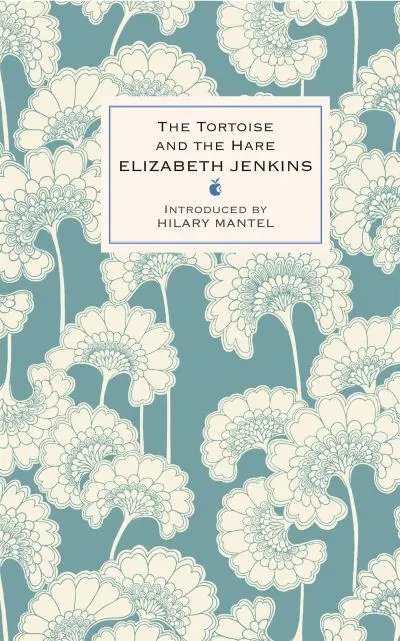
Elizabeth Jenkins was a contemporary of the other two great Elizabeths, Bowen and Taylor, and even though she wrote 13 well-received novels, 10 biographies and a memoir over the period 1929-2004, for some reason she isn’t as well-known to the general reader. She should be. (And not only because she thought Virginia Woolf an “appalling” person).
There are so many pleasures in The Tortoise And The Hare: the glorious descriptions of the English countryside, the elegant and cutting detail that gives life to a character, the clear depths of its psychological observation, and its humour. I’ll let it speak for itself:
Inside in the gloom of the drawing-room the little chandelier, crowned and garlanded, gleamed like drops of rain. To her right the river lay as if unmoving on its silent bed, reflecting the hanging woods on the opposite shore. Behind them rose the chalk downs, bare on their rounded summits except, here and there, for groves of beech. The movement of the river was betrayed by the sound, coming clearly through the still afternoon, that it made on flowing round the bend, where the bed was spread with chalk-coated flints…
Here’s poor little Tim, whose father is an advanced architect busily tearing down cottages and building brutalist monstrosities, his mother a modern-day Mrs Jellyby with artistic pretensions, and his two sisters, Varvara and Ludmilla, scowling, dirty-faced little girls crouched like monkeys in the ilex tree.
Then Tim had strayed in, so frail and light, so hesitant and unhappy that his method of getting himself into the room resembled the wind-blown progress of a dead leaf…
How much this tells you about Imogen and her marriage, in one sentence:
Imogen was so accustomed, in her husband’s absence, to imagining how he would receive people’s remarks, that she felt a faint tremor of the uneasiness she would have felt if Evelyn had been present to hear this…
I loved this exchange with 11-year old Gavin, who has been reading a first-aid manual and is convinced that he could deal with any emergency. Affronted by being told he should leave that to a doctor, he leaves the table, then reappears.
Gavin reappeared in the doorway. “There was a piece in the paper,” he said severely, “about a girl that was shot by brigands, and a chap that knew first aid dug the bullet out of her head with a latch-key.” He disappeared again.
“I wonder how Ludmilla’s foot is this morning,” said Imogen, holding out her hand for Evelyn’s coffee-cup. “Did Paul tell you how he –”
“And another thing,” continued Gavin, putting his head into the room once more, “It said how a chap on board ship saved another chap’s life by taking out his appendix with a tablespoon.”
“Gavin,” said Evelyn, folding the Sunday Times over and over with great force, “If you must give us this lecture, come in and get it over.”
“It doesn’t matter now,” said Gavin, going out again. His tone conveyed that they had forfeited their chance of something very valuable.
It’s Gavin who later sends a telegram from school, Dad I bust a boys arm Gavin.
The Tortoise And The Hare is the story of the disintegration of a marriage. The epigraph quotes from Othello:
Emilia: O, who hath done this deed?
Desdemona: Nobody; I myself.
This has a particular bite. Imogen’s husband is responsible for the breakup of the marriage, and yet Imogen, just by being the woman she is, has made it possible. She is not displaced by a younger, prettier, woman, but by a middle-aged, plain woman, and the truth of the matter, as Imogen herself sees, is that Blanche Silcox is a much better partner for Evelyn, having the same ruthless, pragmatic attitude to life and the same iron-clad ego. A sensitive, tender woman who always puts her husband first can’t hope to compete.
Some people see Blanche, the heavy, lumpen one, as the tortoise and the lightfooted Imogen as the hare, but I think it’s the reverse. Blanche is the hare who seems to win, but there is some hope, for me, at least, that Imogen, so slow to understand the race she’s in, will in the end be happy with what she’s won.
A terrific piece on one of my favourite Viragos! Jenkins is so precise and insightful, the passages on the dissolution of this marriage are painful to read…
Reading this sent me back to your lengthy review which says everything there is to be said, I think. Jenkins was a very interesting character in real life too.
I have this one on my shelf. I thought I would like it, and now I’m sure I will.